Digital Agency Operations Explained: Systems, Challenges, Tools
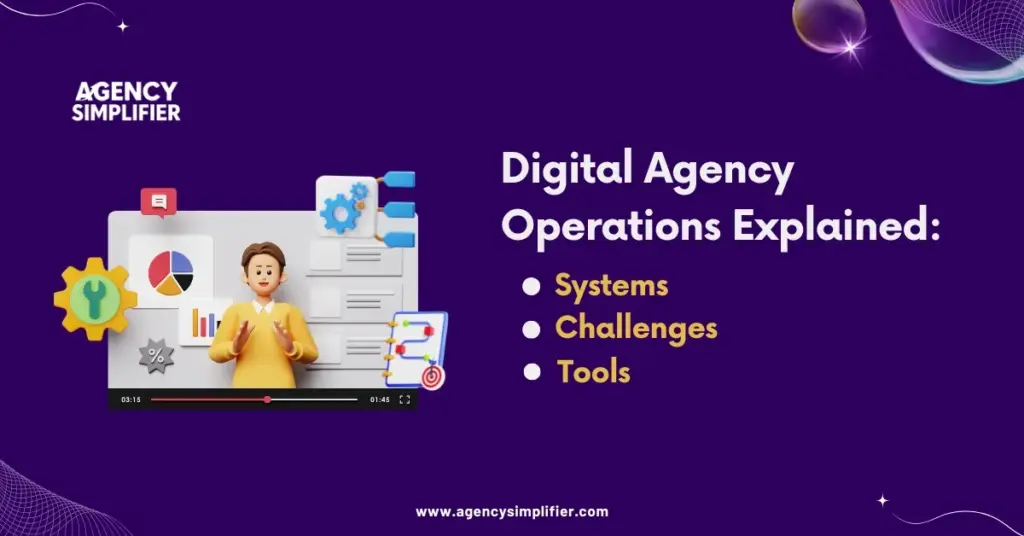
Running an agency’s operations can feel like spinning plates; one wrong move and deadlines slip, budgets balloon, or creative work gets stuck in endless review loops. Yet the agencies that grow from good to great are the ones that build a robust operations backbone.
Agency operations encompass all the internal processes, workflows, and systems that ensure an agency delivers client work efficiently and consistently. While the core principles apply broadly, digital agency operations and advertising agency operations often have unique nuances in deliverables, client touchpoints, and metrics.
An effective agency operations manager doesn’t just keep the lights on; they architect your processes, choose the right tools, and optimize every handoff to minimize friction and maximize profitability. As agencies scale their services from SEO and paid media to video production and creative design, their operations must adapt in lockstep.
Here’s what you’ll discover in this ultimate guide:
- What agency operations really entail
- The critical role of an agency operations manager
- The core systems and tools modern agencies rely on
- Proven frameworks to build and refine your operations
Plus, you’ll see how Agency Simplifier and other top platforms can help you structure your processes, overcome common challenges, and turn operational chaos into a lasting competitive advantage.
What Is Agency Operations?
Operations are the engine of any successful agency. They define how work gets done, ensuring that creative ideas are translated into tangible results efficiently and profitably.
- Why operations matter for agency: Strong operations are the foundation for sustainable growth. They prevent burnout, reduce errors, improve client satisfaction, and ultimately, boost your agency’s bottom line by maximizing efficiency and resource utilization.
- What’s agency operations management? It’s the strategic discipline of designing, implementing, and optimizing the internal processes, workflows, and systems that enable an agency to deliver its services effectively. It’s about creating a repeatable, scalable framework for success.
At its core, agency operations management combines:
- Process management: Standardizing how tasks flow from brief to delivery, ensuring consistency and quality.
- Workflow optimization: Continuously refining processes to eliminate bottlenecks and improve efficiency.
- Resource planning: Matching the right talent to the right projects at the right time, optimizing team utilization, and preventing overload.
- Performance tracking: Monitoring budgets, timelines, and quality metrics to ensure projects stay on track and meet objectives.
By establishing clear workflows and shared operating procedures, agencies can scale without sacrificing creativity or client satisfaction.
The Role of an Agency Operations Manager
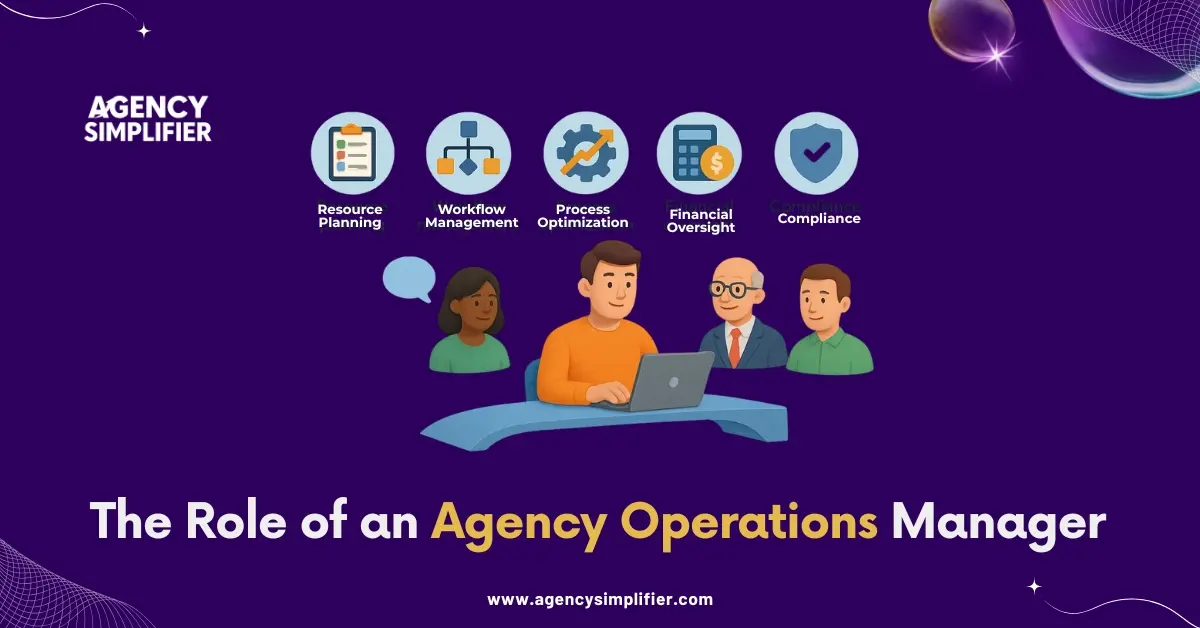
A skilled agency operations manager is the organizational linchpin. They translate strategic goals into executable processes and ensure every team member—from account managers to creatives—knows what to do, when, and how.
- What does an agency operations manager do/handle?
An operations manager is responsible for the overall efficiency and effectiveness of an agency’s internal workings. They are the architects of the agency’s operational framework, ensuring seamless execution of projects and optimal resource utilization.
Their Core Responsibilities include:
- Resource Planning: Forecasting capacity, allocating team members to projects, and balancing workloads to prevent burnout and maximize billable hours.
- Workflow Management: Designing, documenting, and implementing Standard Operating Procedures (SOPs) for everything from client onboarding to project delivery and offboarding.
- Process Optimization: Continuously identifying bottlenecks, streamlining handoffs between departments, and implementing automation to improve efficiency and reduce manual effort.
- Financial Oversight: Tracking project budgets, monitoring profitability, reporting on key financial metrics (P&Ls), and enforcing billing cycles to ensure healthy cash flow.
- Compliance & Quality: Ensuring that all agency work adheres to brand guidelines, legal requirements, data privacy standards, and overall quality benchmarks.
Acting as the bridge between teams, leadership, and clients, the operations manager ensures that strategic vision is translated into actionable plans, and that all departments are working cohesively towards common goals. They are crucial for driving both growth and efficiency, often uncovering significant lifts in billable capacity by optimizing processes and minimizing scope creep.
Core Systems Powering Agency Operations
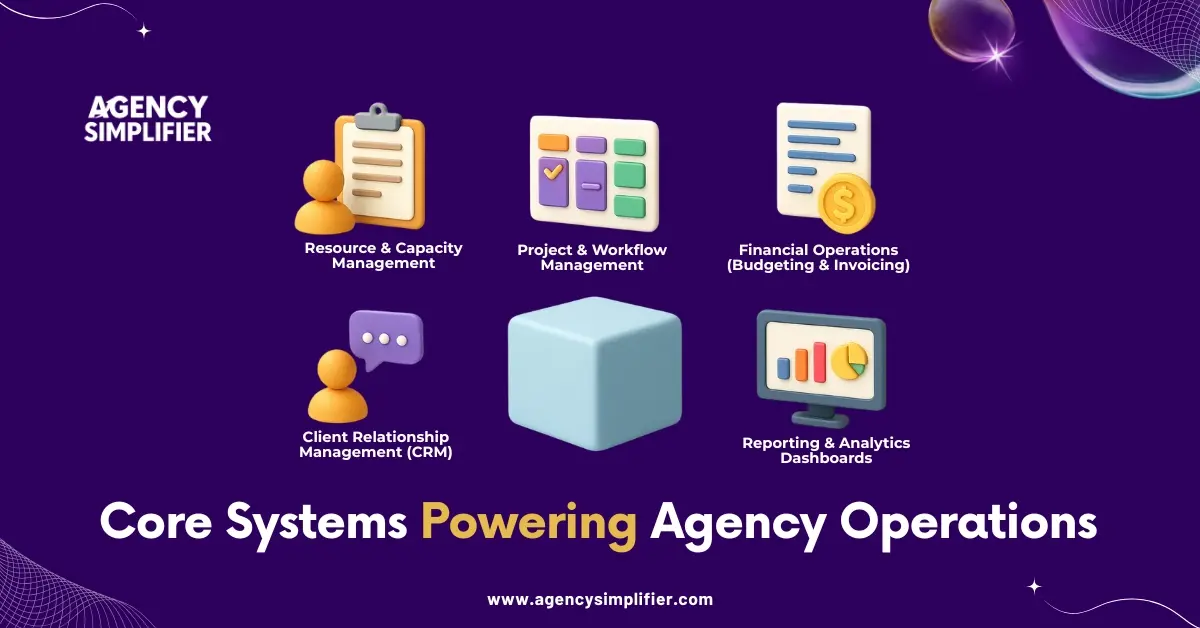
To orchestrate the complex dance of people and projects, agencies depend on a suite of interlinked systems. When integrated, these systems create an operational spine, allowing data to flow seamlessly from initial pitch through final invoice.
- Resource & Capacity Management: Tools that visualize team availability, skills, and utilization rates, ensuring you always have the right people on the right projects.
- Project & Workflow Management: Platforms for task assignment, milestone tracking, collaboration boards, and automated workflows that keep projects moving forward.
- Financial Operations (Budgeting & Invoicing): Systems that integrate time-tracking with billing, revenue recognition, expense capture, and financial reporting, providing a clear picture of your agency’s profitability.
- Client Relationship Management (CRM): Databases for prospect and client information, pitch tracking, communication history, and relationship management, ensuring personalized and consistent client experiences.
- Reporting & Analytics Dashboards: Real-time views of campaign performance, project health, and financial KPIs, enabling data-driven decision-making and transparent client reporting.
Key Challenges in Agency Operations
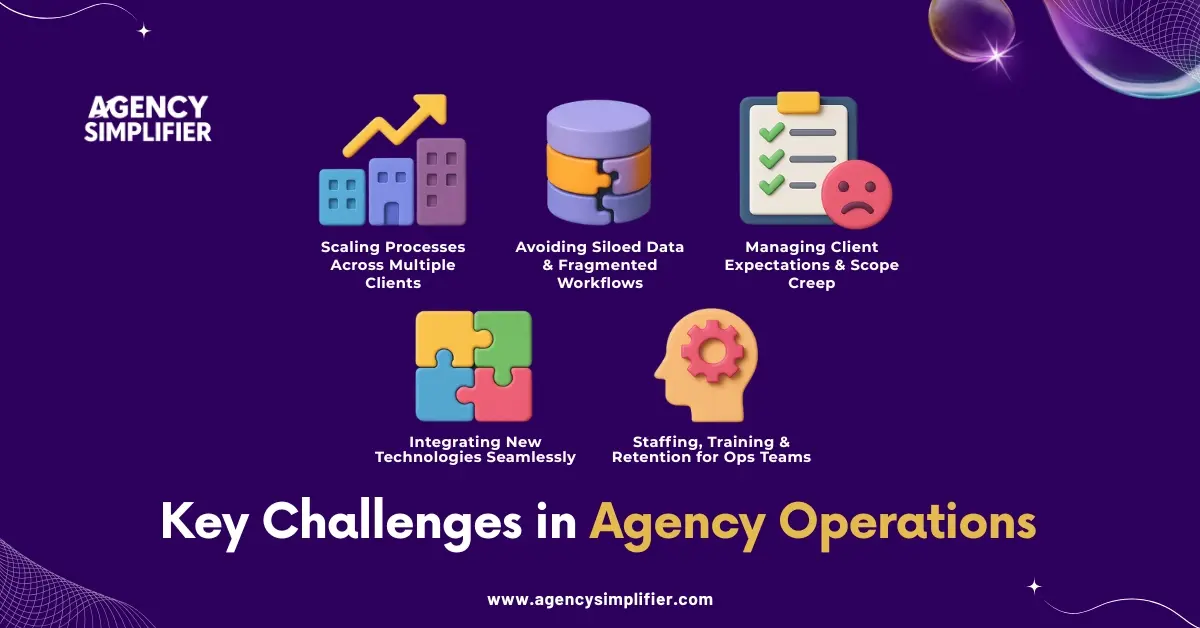
Even with robust systems in place, agencies frequently encounter common hurdles that can impede efficiency and growth:
- Scaling Processes Across Multiple Clients: Replicating workflows that work for one project across numerous different clients without reinventing the wheel is a constant challenge. Standardizing processes while maintaining flexibility is key.
- Avoiding Siloed Data & Fragmented Workflows: Ensuring time, budget, and performance data live in a unified system, not isolated spreadsheets or disparate tools is crucial for accurate reporting and efficient operations.
- Managing Client Expectations & Scope Creep: Balancing client flexibility with firm change-control procedures is essential to prevent projects from expanding beyond their initial scope, which can lead to budget overruns and missed deadlines.
- Integrating New Technologies Seamlessly: Onboarding the latest automation or AI tool without disrupting existing workflows requires careful planning, testing, and team training to ensure smooth adoption and maximum benefit.
- Staffing, Training & Retention for Ops Teams: Building a career path for operations specialists and keeping them engaged as the agency grows is vital. High turnover can lead to loss of institutional knowledge and operational inefficiencies.
Essential Tools to Streamline Operations
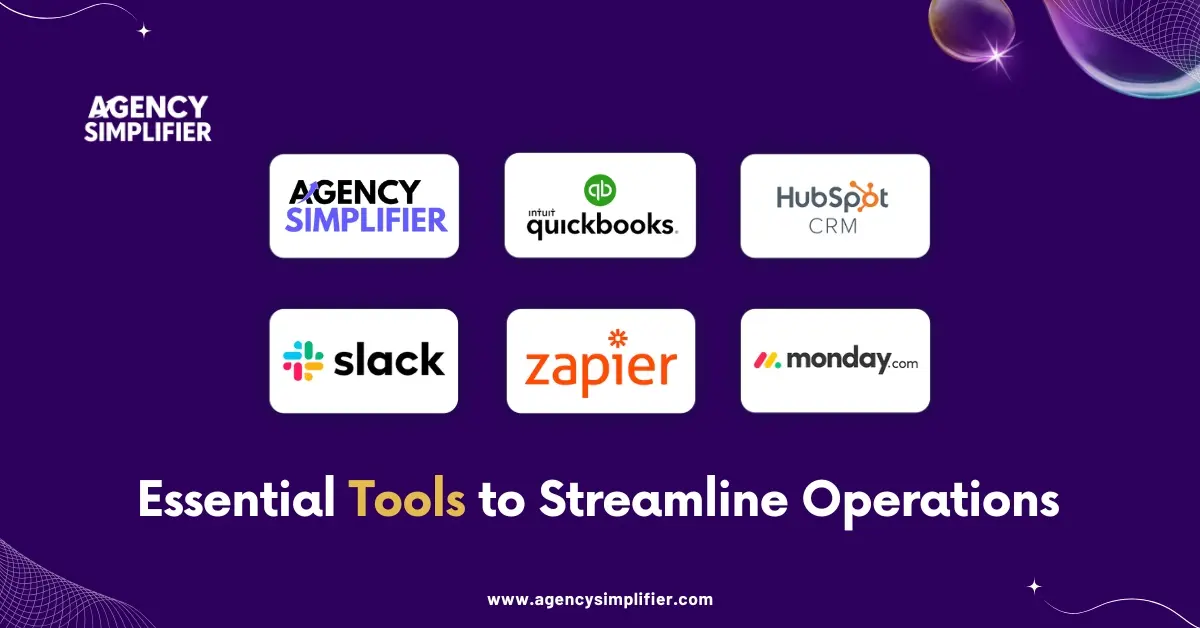
While a comprehensive tech stack is crucial, certain tools stand out for their ability to significantly streamline agency operations. Here are some essential categories and examples:
1. Agency Simplifier: All-in-one dashboard for comprehensive agency management
- Features: Centralized client management, integrated invoicing and time tracking, customizable workflows, project management, resource planning, and robust reporting.
- Pros: Consolidates multiple functions into one platform, reducing tool sprawl and integration headaches. Designed specifically for agencies, addressing their unique operational needs. Improves financial visibility and project profitability.
- Cons: As an all-in-one solution, it may require a learning curve for teams accustomed to disparate tools. Customization options, while extensive, might require initial setup time.
2. Monday.com: Workflow automation and project management
- Features: Highly visual and customizable boards, task management, team collaboration, automation recipes, and integrations with popular apps.
- Pros: Extremely flexible and adaptable to various workflows. Excellent for visual project tracking and team collaboration. User-friendly interface.
- Cons: Can become complex for very large or intricate projects. Reporting features might be less robust than dedicated project management tools for enterprise-level needs.
3. HubSpot CRM: Client relationship management
- Features: Contact management, sales pipeline tracking, marketing automation, customer service tools, and detailed analytics.
- Pros: Comprehensive CRM suite that grows with your agency. Strong marketing and sales automation capabilities. Excellent for nurturing leads and managing client communications.
- Cons: Can be expensive for larger teams or advanced features. Some agencies might find it overkill if they only need basic contact management.
4. QuickBooks: Financial operations and accounting
- Features: Invoicing, expense tracking, payroll, financial reporting, and tax management.
- Pros: Industry-standard for small to medium-sized business accounting. User-friendly interface. Strong integration with many other business tools.
- Cons: Can be complex for agencies with very specific project accounting needs. May require additional integrations for time tracking or project-specific billing.
5. Slack: Team communication and collaboration
- Features: Real-time messaging, channel-based communication, file sharing, voice and video calls, and extensive integrations.
- Pros: Excellent for instant communication and reducing email clutter. Fosters team collaboration and quick problem-solving. Highly customizable with apps and integrations.
- Cons: Can lead to information overload if not managed properly. Free version has limitations on message history.
6. Zapier: Integrations and automation
- Features: Connects thousands of apps to automate workflows without coding. Creates automated multi-step workflows (Zaps).
- Pros: Incredibly powerful for automating repetitive tasks between different software. Saves significant time and reduces manual errors. No coding knowledge required.
- Cons: Can become complex to set up for intricate workflows. Pricing scales with usage, which can become costly for high-volume automations.
Building Your Agency Operations Framework
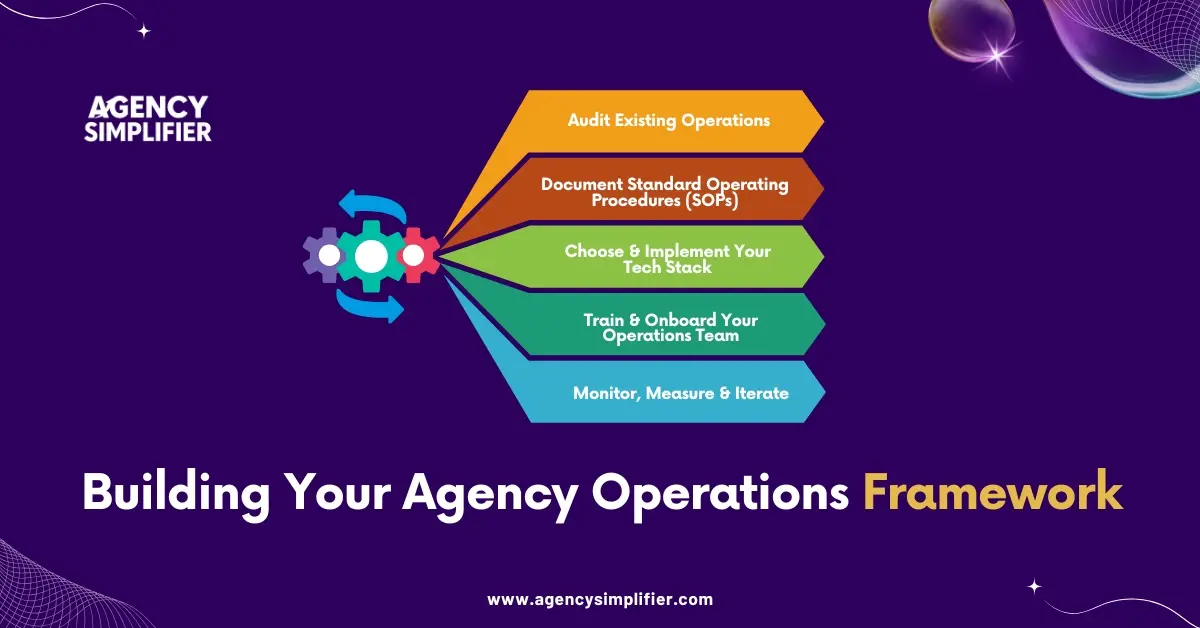
Implementing a robust operations framework is a continuous journey of improvement. Here’s a five-step process to guide your agency:
Step 1: Audit Existing Operations: Begin by mapping your current workflows, identifying all tools in use, and pinpointing pain points, bottlenecks, and areas of inefficiency. Gather feedback from all team members.
Step 2: Document Standard Operating Procedures (SOPs): Create clear, concise playbooks for every repeatable process, from client brief intake and project kick-offs to revision cycles and final delivery. SOPs ensure consistency and reduce errors.
Step 3: Choose & Implement Your Tech Stack: Select tools that integrate natively and support your documented SOPs. Prioritize solutions that address your identified pain points and offer scalability for future growth.
Step 4: Train & Onboard Your Operations Team: Conduct workshops, provide clear documentation, and establish a feedback loop to ensure your team is proficient with new tools and adheres to SOPs. Continuous training is key.
Step 5: Monitor, Measure & Iterate: Define key performance indicators (KPIs) and objectives (OKRs) for your operations (e.g., reduce average project cycle time by 15%). Regularly monitor these metrics, gather feedback, and optimize your processes monthly.
Conclusion: Mastering Agency Operations for Sustainable Growth
Effective agency operations are not a luxury—they’re a strategic imperative for any fast-growing digital or advertising agency. By empowering a dedicated agency operations manager, standardizing your systems, and leveraging the right tools, you can delight clients, maximize utilization, and drive sustainable growth.
- Recap the three pillars: Systems, Challenges & Tools in agency operations: We’ve explored how robust systems provide the backbone, how understanding common challenges allows for proactive solutions, and how the right tools empower your team to overcome these challenges and optimize performance.
- Reinforce why Agency Simplifier is the go-to for ops managers: Agency Simplifier stands out as a comprehensive solution designed to centralize, streamline, and simplify the complex world of agency operations, making it an invaluable asset for any operations manager.
Ready to Transform Client Management?
Frequently Asked Questions About Agency Operations
Q1. What are the core systems in digital agency operations?
Ans: The core systems typically include Resource & Capacity Management, Project & Workflow Management, Financial Operations (Budgeting & Invoicing), Client Relationship Management (CRM), and Reporting & Analytics Dashboards.
Q2. How does an agency operations manager differ from a project manager?
Ans: An agency operations manager focuses on the overarching processes, systems, and tools that enable the entire agency to function efficiently. A project manager, conversely, focuses on the successful execution of individual client projects within those established operational frameworks.
Q3. What challenges do advertising agency operations teams face?
Ans: Advertising agency operations teams often face unique challenges related to managing high-fidelity creative reviews, coordinating complex production schedules (e.g., for TV commercials or large print campaigns), and aligning large media buys with precise invoicing and performance tracking.
Q4. Can small agencies implement enterprise-grade operations systems?
Ans: Yes, many platforms, including Agency Simplifier, offer modular and scalable solutions with usage-based pricing. This allows boutique shops and small agencies to access powerful operational tools that grow with their needs, without the prohibitive costs associated with traditional enterprise software.
Shripad Deshmukh
Shripad Deshmukh, founder of Agency Simplifier, brings over 15 years of experience in custom SaaS development and product management. With a strong focus on digital transformation and multi-platform customer experiences.